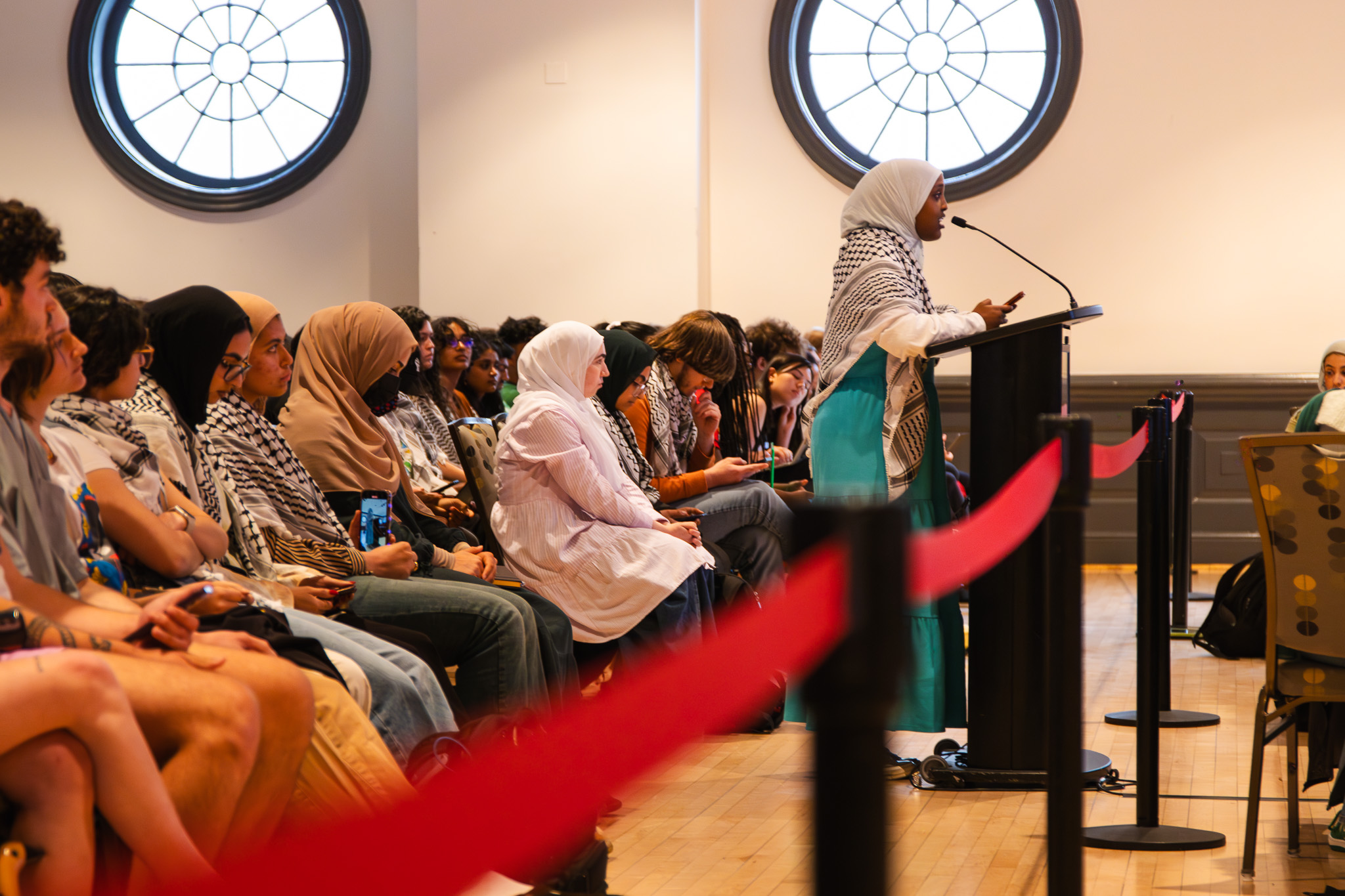By Sam Gauntt and Natalie Weger
The University of Maryland SGA failed to advance a resolution Wednesday that called on the University System of Maryland Foundation to divest from “companies engaged in human rights violations” during its general body meeting.
Hundreds of students gathered in Stamp Student Union’s Colony Ballroom for the meeting. After two hours of public comment about the divestment resolution, including more than 50 student testimonies, the Student Government Association voted to not consider the resolution this semester.
The proposed resolution urged the university system foundation — which manages the university system’s financial assets — and this university’s administration to withdraw investments from companies that do not align with the universal human rights, labor, environment and anti-corruption principles in the United Nations Global Compact.
The resolution received an unfavorable report from the SGA’s student affairs committee on April 11.
SGA legislators present on Wednesday voted to uphold the student affairs committee’s unfavorable report, 18-17, with one abstention. Because the unfavorable committee report was upheld, the legislature did not vote on the resolution.
This university said students would be conducting any debate on the proposed resolution and “the outcome will have no bearing on university policy or practice” in a Wednesday statement to The Diamondback.
Conversations about divestment have increased amid recent violence in Israel and Palestine. An Oct. 7, 2023, Hamas attack killed at least 1,200 people in Israel and took about 250 people hostage, according to the Associated Press. Israel declared war on Hamas the next day and more than 33,000 people in Palestine have been killed since October, the Associated Press reported Thursday.
The resolution referenced “human rights crises” across the world in places such as Palestine, Myanmar, Guatemala and Yemen.
[UMD SGA committee votes against divestment resolution]
In a statement on Instagram, this university’s Jewish Student Union said it was “relieved” by Wednesday’s decision and that the resolution would have isolated Jewish and Israeli students.
“At a time when divisiveness threatens to fracture the unity of our university community, the rejection of [the divestment resolution] serves as a beacon of hope for solidarity and understanding,” the statement read.
Similar divestment resolutions failed to advance through the SGA in 2017 and 2019.
About 30 attendees spoke in favor of the resolution during Wednesday’s public comment session.
Junior philosophy and physics major Matt Foos said the companies the resolution targets — which include Lockheed Martin, Northrop Grumman and BAE Systems — are “aiding and abetting crimes in human rights and genocide.”
“Divesting from [these companies] is the absolute least that we can do for all the lives that they have destroyed and the genocide they’re currently enabling,” Foos said in his testimony.
This university’s Students for Justice in Palestine chapter said in a statement to The Diamondback that Wednesday’s meeting was “a victory on an ideological front.”
“Never before has the divestment bill come this close,” the statement said. “We will never surrender.”
Junior women’s, gender and sexuality studies major Brandee Kaplan said the violence in Palestine is “the destruction of people, communities and the planet in the most well-documented genocide in history.”
“It is not the job of the SGA to create unity. Like any democratic institution, it is the job of the SGA to act in the interests of its constituents,” she said. “We are your constituents. We are here participating in your democratic process, screaming at the top of our lungs.”
[UMD students supporting Palestine protest Israeli politician’s talk]
Diego Henriquez, a freshman environmental science and technology major, also spoke in favor of the resolution. Henriquez, who is from El Salvador, expressed support for the resolution because of its power to support those from countries facing the “legacy of colonialism and apartheid.”
“[The resolution] may be symbolic and non-binding, but it represents a step towards justice,” Henriquez said. “We don’t care if it affects us or not. We care if it uplifts the oppressed.”
Students who testified against the resolution voiced concerns that it would divide the campus community and lead to threats against Jewish students at this university.
Erez Keler, a sophomore computer science major, said in his testimony that claiming the divestment resolution poses no threat to the Jewish community at this campus would be “insane.”
“Right now, our campus is incredibly divided,” Keler said during his testimony. “The passing of the divestment bill will further the division on this campus and that is not what we need.”
Daniel Levy, a senior mathematics and physics major, said the divestment resolution would have targeted the Jewish community if it was passed.
“If we are being honest here, this bill will not affect the Israeli government at all,” Levy said during Wednesday’s meeting. “It will harm Israeli civilians and Jews around the world and on campus in particular.”
Levy said this university’s Jewish community came together to ask the SGA with “one loud voice” to reject the resolution.
The university system declined to comment on the resolution.



